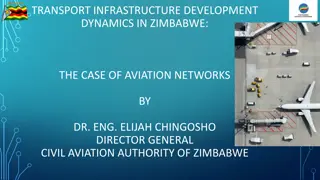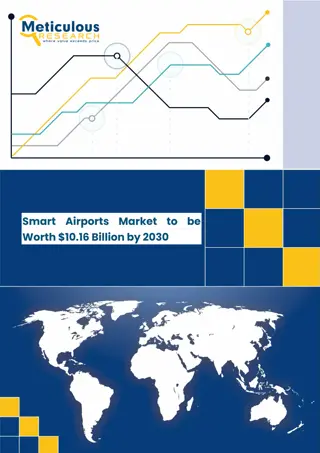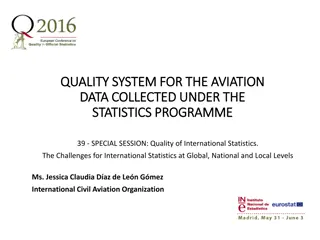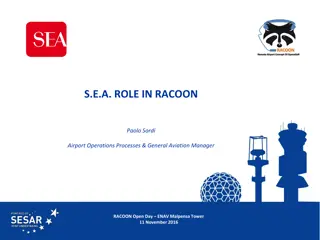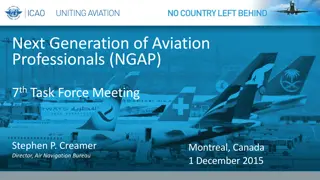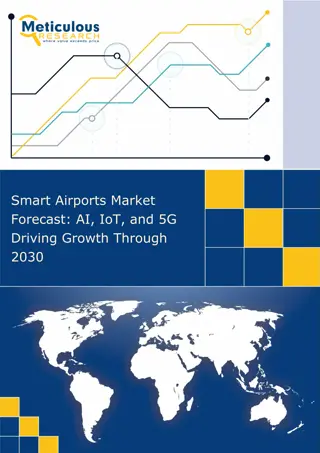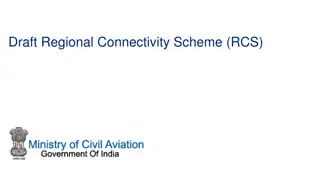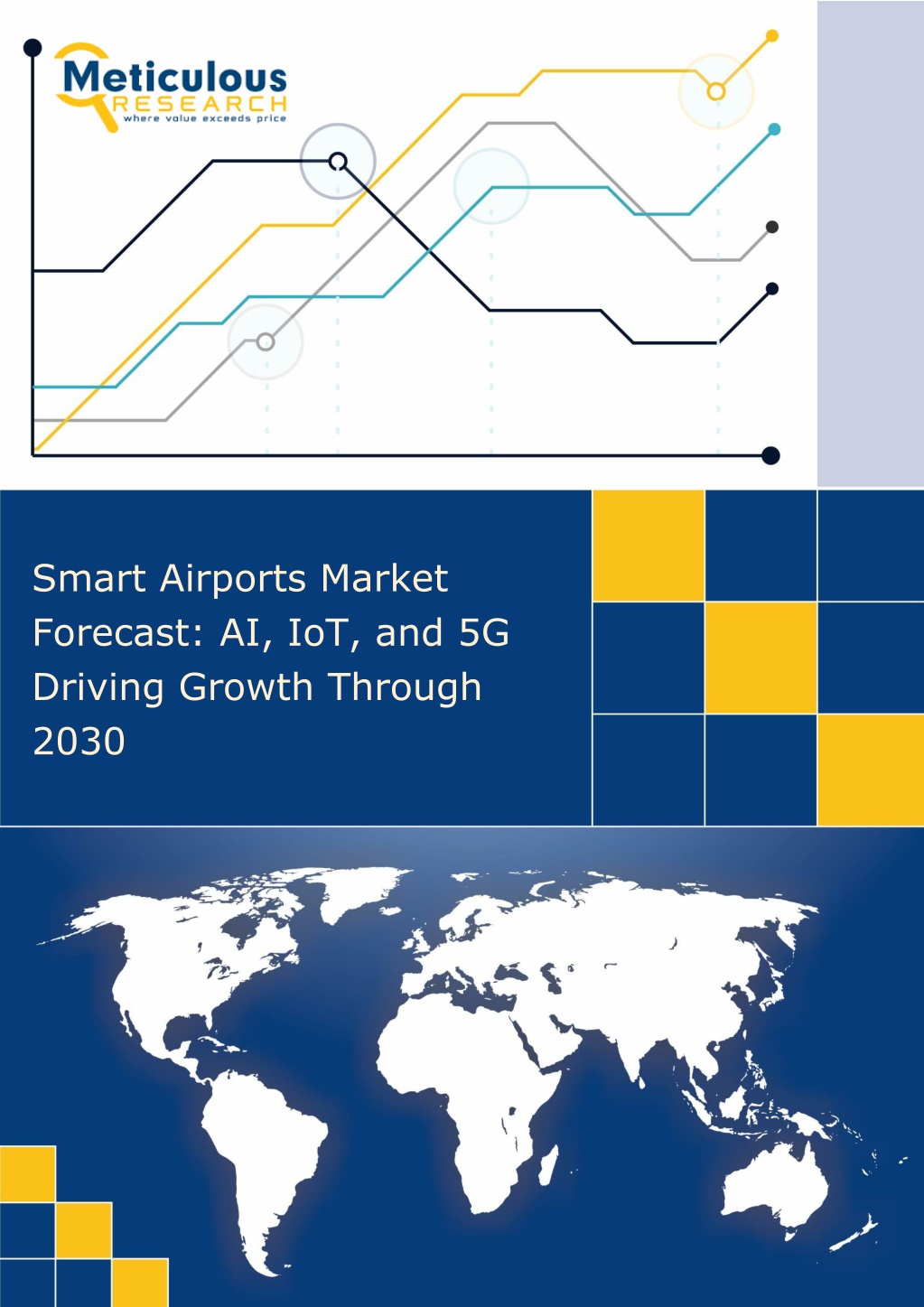
Smart Airports in 2030: How Technological Advancements Are Redefining Aviation
Smart Airports Market by Offering (Systems, Services), Application (Terminal Side (Baggage Management, Passenger Management, Resource Management, Others), Airside, Ground Side), Technology (AI, IoT, 5G, Others), and Geography - Global Forecast to 203
Uploaded on | 1 Views
Download Presentation

Please find below an Image/Link to download the presentation.
The content on the website is provided AS IS for your information and personal use only. It may not be sold, licensed, or shared on other websites without obtaining consent from the author. Download presentation by click this link. If you encounter any issues during the download, it is possible that the publisher has removed the file from their server.
E N D
Presentation Transcript
Smart Airports Market Forecast: AI, IoT, and 5G Driving Growth Through 2030
Global Smart Airports Market 2024-2030 The smart airports market is set to experience significant growth, according to Meticulous Research s latest report titled "Smart Airports Market by Offering (Systems, Services), Application (Terminal Side, Airside, Ground Side), Technology (AI, IoT, 5G), & Geography - Global Forecast to 2030." The market is projected to reach $10.16 billion by 2030, growing at a CAGR of 7.8% between 2024 and 2030, driven by the rising adoption of technology at airports and the implementation of self-service solutions. The integration of smartphones in csheck-in processes and the growing use of automated baggage handling systems are also driving growth, although data privacy concerns and challenges in integrating various technologies may hinder market expansion. Download Sample Report Here @ https://www.meticulousresearch.com/download- sample-report/cp_id=5737 Market Breakdown by Offering The global smart airports market is split into systems and services, with the systems segment expected to dominate in 2024. Growing investments in technologies that improve passenger experience, like Amadeus IT Group s cloud-hosted passenger processing system at Noida International Airport, are key drivers. This segment is also anticipated to witness the highest growth due to increasing demand for mobile check-in and self-service kiosks, along with innovations like Thales Group's HELIXVIEW. Applications and Growth Areas By application, the smart airports market is divided into terminal side, landside, and airside. The terminal side is expected to capture the largest market share in 2024 due to increasing passenger traffic, advancements in baggage handling, and the deployment of digital signage. Innovations like Munich Airport s smart baggage trolleys and Bengaluru Airport s intelligent vision platform highlight the growing trend of smart technologies in terminals. This segment is set to grow rapidly, fueled by investments in AI robots, 5G technology, and airport digitization, such as Israel's major upgrade of Ben Gurion International Airport. Technology Advancements Technologies like AI, IoT, and 5G are transforming the airport experience. In 2024, IoT is forecasted to lead, driven by its applications in safety and efficiency, such as Hyderabad International Airport s smart baggage trolleys. Meanwhile, AI is poised to see the highest growth, particularly in automating airport processes. AI is being implemented in airports like Abu Dhabi to improve passenger services and in Eindhoven to optimize operations. Buy Now @ https://www.meticulousresearch.com/Checkout/25380835 Geographic Trends North America is predicted to lead the global smart airports market in 2024, driven by increased investments in airport technology and biometric boarding solutions. Page 1 of 3 Meticulous Research| sales@meticulousresearch.com
Global Smart Airports Market 2024-2030 Some of the recent developments are as follows: In May 2024, Honeywell International Inc. (U.S.), a company operating in areas such as aerospace, building technologies, and performance materials and technologies, launched an updated suite of airside solutions, with enhancements to its gate and turnaround and airfield lighting portfolios, including the Honeywell NAVITAS Smart Visual Docking system. In May 2022, Miami International Airport (MIA) announced its plans to implement biometric boarding for international flights across all of its 130+ gates in collaboration with SITA (Switzerland), with the expected completion by 2024. The market in Asia-Pacific is projected to register the highest CAGR during the forecast period. The growth of this regional market is driven by factors such as the increasing investments in the construction of new airports and expansion of existing ones, a rapid surge in passenger traffic in countries like China, India, Japan, and South Korea, the widespread adoption of automation technologies throughout airports, and a growing emphasis on partnerships between airports and key market players for digital transformation. Furthermore, airports in the region are digitizing processes such as online check-ins, e-boarding passes, and real-time flight updates, contributing to the market s growth. For instance, Asiana Airlines, Inc., a South Korean airline, facilitates seamless check-in through its web homepage or mobile app and provides passengers with e-boarding passes in advance. Some of the recent developments are as follows: In July 2021, Bangalore International Airport Limited (BIAL), operator of Kempegowda International Airport, Bengaluru, partnered with IBM Corporation (U.S.) to accelerate digital and IT transformation. Under this ten-year partnership, IBM Corporation (U.S.) and Kyndryl Inc. (U.S.) will provide IT solutions to create a new Airport in a Box platform to enhance the end-to-end travel experience for passengers at BLR Airport. In August 2022, Accenture plc (Ireland) and Changi Airport Group (Singapore) extended their collaboration for another three years to transform operations and enhance the experience for travelers visiting Singapore Changi Airport. Key Players: Some of the key players operating in the global smart airports market are Honeywell International Inc. (U.S.), Collins Aerospace (U.S.), SITA (Switzerland), Siemens AG (Germany), Daifuku Co., Ltd. (Japan), Amadeus IT Group SA (Spain), Huawei Technologies Co., Ltd. (China), T Systems International GmbH (Germany), Cisco System, Inc. (U.S.), IBM Corporation (U.S.), Thales Group (France), Schneider Electric SE (France), Wipro Limited (India), Veovo (U.K.), Sabre Corporation (U.S.), Ascent Technology (U.S.), Leidos, Inc. (U.S.), and Gorilla Technology Group Inc. (U.K.). Check complete table of contents with list of table and figures: https://www.meticulousresearch.com/product/smart-airports-market-5737 Key questions answered in the report: What are the high-growth market segments in terms of offering, application, and technology? What is the historical market size for smart airports across the globe? Page 2 of 3 Meticulous Research| sales@meticulousresearch.com
Global Smart Airports Market 2024-2030 What are the market forecasts and estimates for 2024 2030? What are the major drivers, restraints, opportunities, and challenges in the global smart airports market? Who are the major players in the global smart airports market, and what are their market shares? What is the competitive landscape like? What are the recent developments in the global smart airports market? What are the different strategies adopted by the major players in the market? What are the geographic trends and high-growth countries? Contact Us: Meticulous Research Email- sales@meticulousresearch.com Contact Sales- +1-646-781-8004 Connect with us on LinkedIn- https://www.linkedin.com/company/meticulous-research Page 3 of 3 Meticulous Research| sales@meticulousresearch.com


